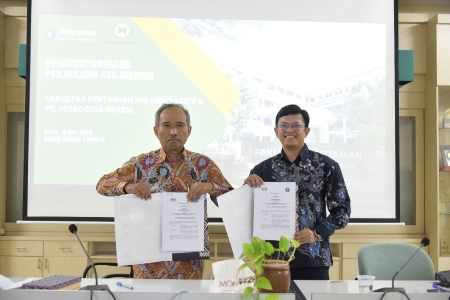Faculty of Agriculture IPB University and PT Petrosida Gresik Sign Cooperation Agreement

Faculty of Agriculture (Faperta) IPB University and PT Petrosida Gresik signed a Cooperation Agreement (PKS). The signing was carried out by Prof Dr. Ir. Suryo Wiyono, M.Sc.Agr, Dean of Faperta IPB University with Pandu Hilda Swaraga MSF, Finance Director of PT Petrosida Gresik.
Prof Suryo Wiyono said the cooperation agreement was an implementation of the Memorandum of Understanding (MoU) between the two parties. He also welcomed this collaboration.
"Faperta is older than IPB University itself. Faperta was established in 1940 with the first lecture at the University of Indonesia. Therefore, we have a long track record for research and innovations," he said.
Prof Suryo said, the scope of this collaboration according to him was quite broad. Not only research development in the field of pesticides, biopesticides and products but also in academic activities.
"Academics could be classified into two categories, first is conventional academics such as research, thesis, thesis and dissertation. Second, academics in terms of Merdeka Belajar Kampus Merdeka (MBKM) which is currently in full swing," said Prof Suryo.
On the same occasion, Pandu Hilda Swaraga, MSF revealed that PT Petrosida Gresik is a subsidiary of PT Pupuk Indonesia, the largest and most comprehensive fertilizer company in Indonesia.
"We are a professional, potential and growing agroindustry company in Indonesia. PT Petrokimia Gresik was established in 1984 by producing the first active chemical for agriculture and plantation in Indonesia. He added, PT Petrokimia Gresik provides agricultural chemical products (agrochemicals) such as pesticides, fertilizers and chemicals to support the agrochemical industry.
"With such a large area of agricultural land and plantations in Indonesia supported by more than 20 years of experience in the agrochemical industry, PT Petrokimia Gresik strives to participate and provide the best with quality products to farmers and business actors engaged in agriculture and plantations to save their crops and help the government create food self-sufficiency in Indonesia," he concluded. (Ns/Rz) (IAAS/NVA)



